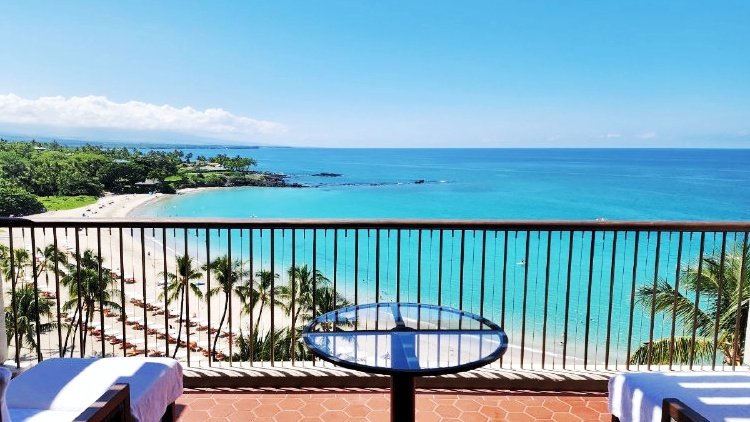Hawaii’s vacation rental market faces another shake-up that could impact visitors and residents alike. As Airbnb moves away from traditional property managers with local Co-Hosts, the question arises: Will this reshape the rental landscape in Hawaii? And what effect will this have on the local communities, especially as Hawaii faces the pressures of increasing gentrification fueled by short-term rentals?
Airbnb’s latest program shifts management tasks like cleaning and check-in away from traditional local businesses, raising potential issues for residents and guests.
The landscape of Hawaii vacation rentals could face transformation.
With Airbnb’s newly expanded “Co-Host” feature, the platform offers what seems like a dream solution—not for Hawaii visitors, but for property owners. Co-hosts can manage the day-to-day tasks of vacation rentals, reducing the need for traditional property managers, who cost more.
But what does this mean for Hawaii’s long-standing vacation rental managers, who have been the go-to experts for decades? As Hawaii’s tourism industry faces another shift, could this lead to further gentrification and the potential displacement of locals?
Airbnb’s newest feature: A game-changer that’s good for whom?
Airbnb’s recently expanded Co-Host program is designed to “ease the workload” for property owners who find managing their rentals expensive. This could be a game-changer for Hawaii’s large pool of absentee owners.
Airbnb’s fast-growing network now has over 10,000 local Co-Hosts worldwide. While Hawaii property owners could save thousands in management fees, this shift may also contribute to gentrification by shifting control away from local managers and potentially affecting community dynamics.
According to Airbnb spokesperson, Nicolette Velazquez:
“We introduced the Co-Host Network to make it easier for hosts to find and hire the best co-hosts to help manage their Airbnb. The network includes our best, local, experienced co-hosts who have an exceptional track record on Airbnb. They have an average rating of 4.86, compared to 4.62 for large property management companies, and on average, manage just 7 listings. In fact, 73% of co-hosts are Superhosts, and 84% of co-hosts manage a Guest Favorite. Co-hosts can set the local area they serve up to a 60 mile/100 km diameter.”
But here’s the Hawaii rub.
Hawaii isn’t just any vacation rental market. The islands face unique challenges, from strict short-term rental regulations to complex permitting requirements. Airbnb’s Co-Host program, while promising, may not fully address these intricacies.
For years, Hawaii’s vacation rental managers have played pivotal roles in ensuring legal compliance, responding to emergency repairs, and maintaining properties with a local, hands-on approach that remote property owners might struggle to match. Their deep knowledge of the local landscape is critical in navigating the complexities of managing properties in Hawaii. Hawaii law also requires that an off-island property owner assign an on-island contact for emergencies, and it appears that co-hosts would qualify.
What does an Airbnb Co-Host offer that a vacation rental manager can’t?
Airbnb’s Co-Host program undoubtedly appeals to property owners by offering lower costs. For those looking to cut down on management fees, this tech-driven, app-based solution streamlines many day-to-day rental tasks. It eliminates the need for more traditional, complex contracts often associated with management companies.
Reducing reliance on full-service property managers provides a more accessible alternative that focuses on affordability and ease of use, potentially reshaping how Hawaii’s rentals are managed. However, whether these savings benefit renters remains uncertain.
The key question remains: will the savings be passed on to visitors?
Kyle, a Beat of Hawaii reader, shared: “I started using Airbnb’s Co-Host feature and quickly saved about $3,000 in management fees. Sure, I miss the hands-on service from my previous local manager, but the savings are hard to beat.”
While the financial benefits for owners are clear, whether renters will see lower prices is still uncertain.
The local impact: Is Airbnb taking business from Hawaii’s rental managers?
There’s growing concern that Airbnb’s Co-Host program could negatively affect local Hawaii businesses. Vacation rental management companies have long been integral to the community, employing locals and supporting essential services. If property owners switch to co-hosting, small, family-run businesses may suffer.
A long-time Maui-based property manager, Hale remarked: “We’ve been working with local families for years. It’s not just about managing rentals; it’s about maintaining properties with aloha. Can a Co-Host really do that with the owner 3,000 miles away?”
On the flip side, Airbnb’s Co-Host model may open new income opportunities for some residents who see this as democratizing access to the rental market. What’s your take?
Get Breaking Hawaii Travel News







How are they handling the requirement for an on-island rep in Maui?
Beth B.
Some local property managers have become greedy, adding their own fees to the Airbnb total in addition to new charges for owner services. What used to be a 25% management fee, but now with all the added fees now actually puts 50% of the stated “rent in the property managers pocket. So yes, the local property managers should be afraid.
BOH, to answer your question, and as explained in the other comments you have received here, the co-host enhancement should not affect operations of STRs in Hawaii, nor should it affect guest satisfaction, since it is already required that there be “boots-on-the-ground” management.
In fact, it could be argued that a co-hosting arrangement is more desirable than the brick-and-mortar, traditional property management company with hundreds of managed units. I have read that many guests prefer dealing with individual hosts rather than management companies, as they feel they get better, more personalized service. Guests even look for and choose such listings when they book.
Hi Pat.
BTW thank you for more than 600 questions. We get your point. We were talking with a management company’s boots on the ground property manager last night, and he pretty much had the same take. We’d be surprised if he doesn’t move to being a Co-Host instead of an employee.
Aloha.
Yes, I think property management companies as well are already starting to change their approach in order to compete with the online platforms. For instance, many of them will allow an owner to list with them, but also allow them to list elsewhere, including their own direct booking websites. Whomever gets the bookings gets the commission.
What isn’t clear here is how the Co-Host will accomplish the maintenance, cleaning, repairs, and so on. That work still needs to be done and it still needs to be done locally; at least on-island. Would they be paying the housekeepers less? Would they simply subcontract to (say) one plumber or electrician instead of getting the first/best available? In the end, it seems to be trying to cut out the local mangers.
In Hawaii what about the requirement that anyone who manages a rental for someone else must be a real estate broker?
Will the state bust the unlicensed amateurs? And the owners?
50% was the cost of property manager when we set up as a STVR. That was a bit high!! (Sarcasm~) Airbnb really charges the guest a large % and I could not honestly say they did anything for that. If you do your part on renting out and use reputable locals for an onisland contact tell me why I would pay someone 50%. First they were going to force us to use a realtor, now Airbnb is selling this like the best thing since sliced bread….for Who? They sent me a letter that they were pulling out of Maui for STR owners, as they were going to pair up with the hotels…you soo know its not the for islands good…they had to make up for the 7K rentals that aren’t renting out…just doing the snake oil sale.
What? Airbnb sent you a letter that they were pulling out of Maui STRs? I haven’t heard that.
Hawaii Law also states that an operator/cohost/onisland rep can only manage 1 unit legally. How will the county/state police co-hosts trying to manage many properties?
There’s a difference between an on-island agent and a property manager. The on-island agent must be local, available to help with service or problems with the property (water leak, etc.), and available to contact 24×7. But they are not required to be a property manager who provides check-in or cleaning or guest relations. Hawaii requires the former, but not the latter.
If there is a new service that provides a value for property owners at a better price, that’s the natural effect of an open market and property managers will need to adapt to compete. That doesn’t mean lower prices or cutting staff is required … it means offer more value that property owners are willing to pay for.
And if the concern is truly for the potential of lost business for local property managers who are a staple of the community, the impact of an AirBnB service is minuscule compared to the impact of a Maui ban on STRs that would cut out 7000+ potential customers. 🤷♂️
9 years ago. after a horrible experience with a property management company which lost clients, disposed of my brand new furnishings & income for me, I will Never let another property management company manage my business again.
I meet all legal requirements to self manage & my vacation rental has an 86% occupancy & 18% returning client rate. Every stay, they stay longer!
I learned by a string of broken promises.
Big mistake not having managers. We will be back to neighbors complaints about noise and no one to take care miles away. Why not do away with the platform of air bnb? That’s a saving there as well
The “Co-Host” feature does not get around the law requiring an “On-Island Contact” An “Island Contact” is required for Short Term rentals, both in condos and homes. The Island contact must be a licensed if they are the contact for more then one home.
Act 204 requires that operators of transient accommodations designate an on-island local contact (us)
“If you’re off-island, you’ll also need to designate a local contact who resides on the same island as the transient accommodation. The local contact may be an individual or an entity with a principal place of business on the same island as the property. Because they are on the same island as the transient accommodation, the local contact may be able to assist with issues which may arise relevant to the transient accommodation. “
On island contacts are still required in Hawaii to take care of maintenance or housekeeping issues should they arise. Many owners will not have much of a choice since taxes, HOA, utilities, supplies etc. Have all gone up significantly. The savings would go to these not to lowering visitor costs. Owners can only stretch so far. This will still provide a personal touch as far as in Hawaii because of the on island contact requirement. Unfortunately, many management companies got greedy with high rates and fees.
Our Kuilima HOA property requires “boots on the ground” property managers. We have local property managers that can address guests issues when we are off island. They have great insight for our guests. We are not switching, we love our local Ohana!
The state of HI still requires owners that do not live on the island their rental is on to employ an on-island manager that is a licensed realtor – correct? The law requires that the manager’s contact information is provided to all guests, is displayed in the unit and on the listing the guest is using to make the reservation. For these owners, it doesn’t matter what Air BnB offers. Owners that live on-island can do what they want but I suspect they represent a very small % of the owners that use managers that you are concerned about now.
I would expect people that run this site to understand this behave differently than posting this article.
I have been managing my vacation rental from afar using trusted local help with clear direction. I do pass on the savings to my customers because I want to provide an affordable place to stay for people who can’t afford to go to Hawaii. I still maintain a high volume of amenities that people have said is the best 1/1 available in Kona. And I have a 9.8 out of 10 rating on Booking because I take care of my guests. I do this at an average of 20% lower than all the other units in my complex without adding any fees. Thats how it should be done. Instead of ripping people off I give them great memories. Something Airbnb, VRBO and the luxury hotel do provide at a much greater cost.